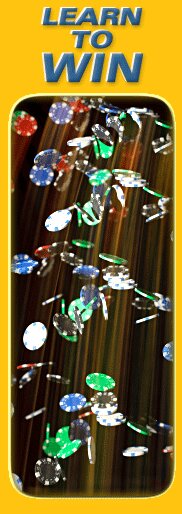Poker Tips
Fast Track Gambling Tips Series
Poker Tips includes history, rules, poker versions, betting, strategies and lingo--an Introduction to the game.
With the popularity of poker online and off, Gambling Teachers includes Poker Tips as part of the fast track gambling tips series.
1) Poker History:
The French called it poque that descended from the German pochen that means to knock. However, it is possible that poker originated from the Persian game of as nas taught to the French settlers by Persian sailors in New Orleans.
2) Poker Tips: Rules and Versions
There are different rules for different versions. There are examples that follow for the basics of a particular versions, rules, etiquette and poker hands.
All versions have a central theme. Winning is everything in poker since this is a mind game more than anything else.
General versions are draw poker, stud poker, wild card games and standard or ‘other games’.
Within the general poker category, there are specific versions.
3) Poker Tips: Draw and Stud Poker Games
The most commonly played of these games are 5-card draw, 7-card stud, and Texas Holdem.
5-card draw rules are generally easy to remember. It is assumed that you know the general poker game play, hand values and betting system. Poker rules differ from home games to formal games played in the casinos.
For formal games, blinds are commonly used while for home games, it is typical to use an ante.
Ante is where the first betting round starts from the player to the dealer's left, and then the second round betting begins with the player who opened or made the first non-zero betting in the preceding round.
A common house rule in playing 5-card draw in home or social games is that a player cannot replace more than three cards, unless he holds an ace or a wild card so that the deck stock will not be depleted quickly. Another common house rule is that the last card in the deck stub is not dealt to ensure that none who might have seen it will use that information.
7-card stud rules are a bit more complex than 5-card draw since two to eight players can play. The only poker rule to remember is two down, four up, one down.
Texas Holdem rules begin with two cards dealt to each player, but then there is a difference from the other two games described.
There is a community board of five cards dealt face up that all participants use to form their poker hands.
4) Poker Tips: Wild Card Games
Wild Card Poker Games are exciting because the wild possibilities can bring an entirely different hand. These versions present ‘a roller coaster ride’ adventure for card players.
Deuces Wild is arguably the most popular of these poker games.
Other wild games are wild widow, spit in the ocean, baseball, football, Heinz, Woolworth and Cincinnati Liz.
Descriptions for 2 of these games follow:
Heinz: This wild card poker game rules state—you guessed it—5’s and 7’s are wild.
The difference is that players dealt any of these wild cards must decide to match the pot or drop out.
Woolworth: Another easy guess for this poker game is that 5’s and 10’s are wild. Players receiving a 5 face up pay 5 chips to the pot or drop out, while those receiving a 10 pay 10 chips or drop out.
5) Poker Tips: Standard Poker or ‘other’ types of games.
Standard Poker: Every player receives 5 cards face down in this original version of poker. There is no draw, therefore a winner is declared after a single betting round.
Let’s not forget the poker versions of knock, whiskey, bull, double draw, cold hands, 2-card, Indian poker, red dog, round the world, 3-card Monte and shotgun.
Descriptions for 2 of these versions follow:
Cold Hands: Comparable to standard poker, but players place an established ante. 5 cards face up are then dealt to each player, one at a time with no draw and no further betting. This poker version is a ‘winner takes all’ game.
2-Card Poker: As the name implies, two cards are dealt to each player and there is no draw. The best possible hand is a pair of aces.
6) Poker Tips: Betting
Poker has different betting systems. They range from the most simple to the most complicated systems.
The most common is the positive progression betting systems where the player usually increases the bet whenever he or she wins. This kind of betting system requires less capital.
However, there is also the negative progression betting systems where the player increases the bet whenever he or she loses.
Unlike the positive progression betting systems, this one requires additional capital. This system can be very painful.
Lastly, there is the insurance betting system wherein you can decrease the amount of your bet in the event that you win which normally follows a high preliminary bet.
According to Amarillo Slim, "Poker is a game of people. It is not the hand that I hold; it is the people I play with."
7) Poker Tips: Lingo
Let’s finish up Poker Tips with the language or lingo of the game. Here are 10 terms.
Big Stick: Ace or King in the hold—great starting hand. There are several possibilities from this hand: high pair and/or high straight.
Blind: The mandatory bet that one or all players must make before the start of a particular game and before any cards are dealt.
Drawn Out: a come from behind move that makes a winning hand.
Fill Up: you want to complete a full house with your pair or three of a kind.
Hole Cards: two cards known only to the player therefore held ‘in the hole’.
Muck: The name of the discard pile for Poker.
Nuts: the best of hands in the game thus far.
Pocket Pair: dealt a pair in the hole. Pocket Pair term is used for Stud and Hold’ Em.
Rake: A percentage and/or flat fee deducted from the pot after each betting round for the casino services. These services include a dealer and equipment.
Scoop: you have just won the whole pot—Congratulations!
Poker Tips: Fast Track Gambling Tips is followed by Poker Skills Test
OR
Return to How to Play Poker Program 1
OR
Continue with Online Gambling Guide
GT is attentive about getting the word out about our free programs, lessons and add-ons offered, however, we ask your assistance and consideration in promoting us.
Click link below that reads, "Enjoy this page? Please pay it forward. Here's how..." to add a link to your site, blog or personal page.
Tips, Terms & Wins
Poker Tips: Best Bets are GT Learn Poker Programs:
Gambling Teachers free learning center offer 2 Poker Programs, 10 Game Types, 42 versions, general strategies, tournaments and 60+ lessons.
10 Types: Holdem, Omaha, Wild Card, Stud, 3-Card, Caribbean Stud, Let It Ride, Pai Gow, European Games & Other Versions.
How to Play Poker Program 1 lessons include General Strategies, Holdem, Omaha, Hi-Lo Games and Wild Card Games.





